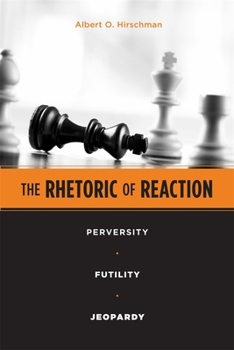The Rhetoric of Reaction: Perversity, Futility, Jeopardy
Select Format
Select Condition 
Book Overview
With engaging wit and subtle irony, Albert Hirschman maps the diffuse and treacherous world of reactionary rhetoric in which conservative public figures, thinkers, and polemicists have been arguing against progressive agendas and reforms for the past two hundred years.
Hirschman draws his examples from three successive waves of reactive thought that arose in response to the liberal ideas of the French Revolution and the Declaration of the Rights of Man, to democratization and the drive toward universal suffrage in the nineteenth century, and to the welfare state in our own century. In each case he identifies three principal arguments invariably used: (1) the perversity thesis, whereby any action to improve some feature of the political, social, or economic order is alleged to result in the exact opposite of what was intended; (2) the futility thesis, which predicts that attempts at social transformation will produce no effects whatever--will simply be incapable of making a dent in the status quo; (3) the jeopardy thesis, holding that the cost of the proposed reform is unacceptable because it will endanger previous hard-won accomplishments. He illustrates these propositions by citing writers across the centuries from Alexis de Tocqueville to George Stigler, Herbert Spencer to Jay Forrester, Edmund Burke to Charles Murray. Finally, in a lightning turnabout, he shows that progressives are frequently apt to employ closely related rhetorical postures, which are as biased as their reactionary counterparts. For those who aspire to the genuine dialogue that characterizes a truly democratic society, Hirschman points out that both types of rhetoric function, in effect, as contraptions designed to make debate impossible. In the process, his book makes an original contribution to democratic thought. The Rhetoric of Reaction is a delightful handbook for all discussions of public affairs, the welfare state, and the history of social, economic, and political thought, whether conducted by ordinary citizens or academics.Format:Paperback
Language:English
ISBN:067476868X
ISBN13:9780674768680
Release Date:March 1991
Publisher:Belknap Press
Length:224 Pages
Weight:0.61 lbs.
Dimensions:0.7" x 5.4" x 8.3"
Customer Reviews
2 ratings
Helpful historical study of conservative rhetoric
Published by Thriftbooks.com User , 21 years ago
Hirschman is concerned with three types of argument typically deployed by reactionaries, i.e. conservatives vehemently, vocally and automatically opposed to proposed changes in the political, social or economic order. The arguments are: (1) Perversity: "The change will only exacerbate the problem you are trying to solve."(2) Futility: "The change will achieve nothing, because it fails to acknowledge incontrovertible political, social or economic laws." (3) Jeopardy: "The change will threaten or destroy some cherished previous accomplishment, such as freedom or democracy." Hirschman's approach is historical. Drawing examples from three key periods of reactionary thought - the aftermath of the French Revolution, the nineteenth-century push for universal suffrage, and the more recent rejection of the Welfare State - he tracks the development, deployment and intertwining of the arguments. His study raises some unstated questions about the psychology of conservatism, the tendency of the populous to be drawn in by such arguments, and the ease with which they can be deployed in short soundbites making them ideal for a modern mass media. Unfortunately, Hirschman doesn't address these issues, so if you're interested in exploring them you will need to look elsewhere. (Eduardo Giannettiï's rather advanced psycho-philosophical study, "Lies We Tell Ourselves: The Art of Self-Deception", might be a challenging place to start. Giannetti addresses the issue only tangentially, but he does give a full account of the kind of self-delusion that a lot of conservative thinking requires.) While the three arguments Hirschman describes have been used most often by conservatives, he turns in the final chapters to the occasional tendency of "progressives" to deploy similarly intransigent arguments. Such even-handedness is refreshing. This book will be useful to anyone wanting to promote or defend a progressive agenda as it delineates the likely arcs of resistance you will face, and alerts you to the possibility of woolly thinking infecting your own arguments. It's strongly recommended for conservatives, too. You'll learn that the kind of thinking you find "natural" and "morally right" has a long and hysterical history. This book will have both sides of the table thinking - which is always a good thing.
Reasons why we have so much trouble hearing each other.
Published by Thriftbooks.com User , 26 years ago
This is one of my favorite books for teaching. Hirschman starts out wondering why those conservatives are so hard to deal with. Notices that no real communication is taking place, just rhetoric, sound bites, as it were.As he follows the mystery of how liberals are ever to get their ideas and the needs of the nation across through the rhetoric of the conservatives, he discovers, much to his own dismay, that the liberals use rhetoric, too. And in much the same way.This book describes three basic patterns of argument in which much is said, but little communicated. It's a great help in guiding students to genuine argument and discourse. Not light reading, but well worth the effort. It's also refreshing to see the reflexive method of recognizing that we do ourselves much of what we accuse others of doing.






